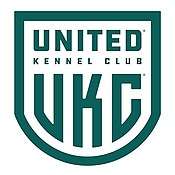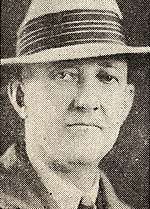United Kennel Club
The United Kennel Club (UKC) is a kennel club founded in 1898 in the United States. In contrast with the American Kennel Club, which is non-profit and which only clubs can join, the United Kennel Club is a profit-making corporation, open to individuals.[1][2][3][4][5]
 | |
| Abbreviation | UKC |
|---|---|
| Formation | 1898 |
| Type | Kennel club |
| Headquarters | Kalamazoo, Michigan, United States |
Region served | United States |
Official language | English |
| Website | www |
History

UKC was founded on February 10, 1898, by Chauncey Z. Bennett, who was motivated by dissatisfaction with the other dog registries, which were, he felt, geared too much for the conformation-only show dog or the wealthy hobby man, what Bennett called "the big city idle rich".[6][1] Bennett conceived and promoted the concept of the "Total Dog", that is, a dog that performs as well as it looks; in which intelligence and working ability were as important as conformation to the written breed standard. Bennett found a niche among the owners of working dogs, such as herding and hunting dogs.[7][8]
Presidents
Chauncey Z. Bennett (founder, and president from 1898 to 1936) initiated the system of numbering the registered dogs. The first dog registered, UKC Number 1, was Bennett’s American Pit Bull Terrier, Bennett’s Ring.[9][10]
Frances Bennett Fuhrman (president from 1936 to 1944),[10] daughter of Chauncey Bennett, improved the editorial content and appearance of the UKC magazine, Bloodlines.
E. G. Fuhrman (president from 1944 to 1973),[10] husband of Frances Fuhrman and son-in-law to Chauncey Bennett, promoted dog shows and introduced the four types of UKC coonhound events: bench shows, night hunts, field trials, and water races.
Fred T. Miller (president from 1973 to 2000), took many steps towards modernization, which improved customer service and turnaround time on registration applications.[10]
Wayne R. Cavanaugh (president from 2000 to 2014),[10] furthered UKC's mission as a proactive and performance-based registry where the health and vitality of each breed were at the forefront of all decisions and advancements. Cavanaugh was chairman of the board from 2014 until his retirement in October 2015.
Tanya Raab (president from 2014 to present),[10] has been with the organization since 1989. with a focus on increased customer service and promotion of the organization's "Total Dog" philosophy.
Programs
The programs at UKC include obedience trials, rally obedience trials, agility trials, weight-pull events, dragging races, dock-jumping events, lure coursing, nose-work, coonhound field trials, water races, night hunts, bench shows, hunt tests for retrieving breeds, pointing-dog events, beagle events (including hunts and bench shows), among others.[11]
Hunting programs
UKC offers field events for all types of hunting dog enthusiasts. The events offered by the Hunting Programs Department at UKC are designed to simulate an actual hunt as closely as possible with the exception of taking of game, which is prohibited. Dogs compete individually or in groups for points towards Championship and Grand Championship titles.[12]
Bully breeds
Founded originally for the purpose of organizing pedigrees for the "pit fighting" dogs,[13] today the UKC maintains a registry of over 300 breeds,[14] including several "bully" dog breeds which the American Kennel Club does not also recognize,[15] — American Bulldog, American Bully, and American Pit Bull Terrier.
AKC now lists American Bulldog [16].
UKC championship
For the United Kennel Club Championship (UKC Ch), a combination of points (for example, winning the class earns 10 points in non-variety breeds, 5 in variety breeds) and competition wins (including group placements and Best In Show/Reserve Best in Multi-Breed Show) are required.[17] In UKC, a dog must receive 100 points with at least three competition wins under three different judges. A competition win is when a dog defeats at least one other dog and receives points. A UKC Grand Champion (GRCh) title is earned by winning in competition with other champions of the breed in at least five shows under at least three different judges.
See also
References
- "United Kennel Club - About UKC". 2018. Retrieved 8 February 2018.
- Newspapers, Knight-Ridder. "HOW TO TELL THE DIFFERENCE BETWEEN THE KENNEL CLUBS". Chicagotribune.com. Retrieved 11 May 2019.
- McAloon, Lois. "A FEISTY FAVORITE". Chicagotribune.com. Retrieved 11 May 2019.
- Simon, Kelly. "Dog show returns to Beaver Dam". Wiscnews.com. Retrieved 11 May 2019.
- Kahn, E. J. (21 August 1954). "DOGGY". Newyorker.com. Retrieved 11 May 2019.
- UKC Centennial Book, The First 100 Years, copyright 1997, UKC
- Sussam, Stephen (27 September 2011). Border Collie. i5 Publishing. ISBN 9781593788834. Retrieved 11 May 2019 – via Google Books.
- Volhard, Jack; Volhard, Wendy (14 September 2011). Dog Training For Dummies. John Wiley & Sons. ISBN 9781118054529. Retrieved 11 May 2019 – via Google Books.
- "Local News - Can Weela's Heroics Change Pitbull Image? - Seattle Times Newspaper". community.seattletimes.nwsource.com.
- "History". United Kennel Club.
- "About UKC Show Operations". United Kennel Club. Retrieved 8 July 2018.
- "Hunting". United Kennel Club (UKC).
- Stahlkuppe, Joe (April 1, 2000). American Pit Bull Terrier Handbook. Barron's Educational Series. p. 55. ISBN 9781438081410 – via Internet Archive.
Chauncey Z. Bennett united kennel club.
- "Breed Standards - United Kennel Club (UKC)". www.ukcdogs.com.
- "Dog Breeds - Types Of Dogs". American Kennel Club.
- https://www.akc.org/dog-breeds/american-bulldog/
- New FAQ Archived April 20, 2008, at the Wayback Machine